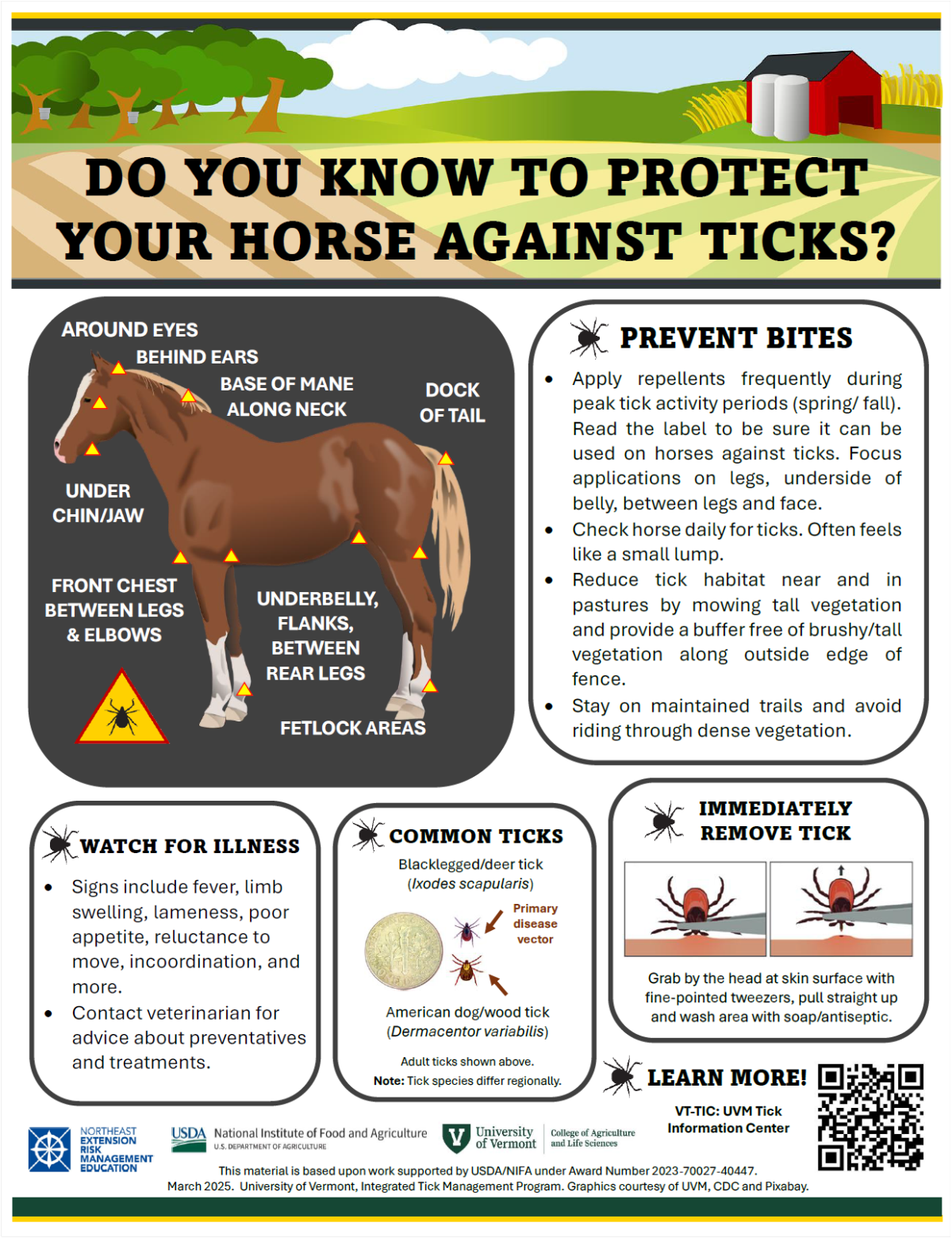Several species of ticks can infest horses and transfer disease-causing pathogens. In the US, the two of the most common tick-borne diseases in horses are Lyme Disease and Equine Granulocytic Anaplasmosis, which are caused by bacteria from blacklegged tick bites. In other regions of the world, ticks cause Equine Piroplasmosis, a blood-borne disease caused by protozoal parasites, and Tick Paralysis when they inject toxins into the bloodstream while feeding. By checking your horse regularly for ticks, applying insecticide repellents and reducing tick habitat along fence lines and within pastures, the risk of tick-borne diseases in horses can be reduced.
Visit the links below to learn more specific information about tick-borne illnesses and prevention in horses.
Horse-Specific Resources:
- Borrelia burgdorferi infection and Lyme disease (American Association of Equine Practitioners)
- External Parasite and Vector Control Guidelines: Ticks (American Association of Equine Practitioners)
- Equine attachment site preferences and seasonality of common North American ticks: Amblyomma americanum, Dermacentor albipictus, and Ixodes scapularis. Sundstrom, K.D., Lineberry, M.W., Grant, A.N. et al. Parasites & Vectors (2021)
- Equine Granulocytic Anaplasmosis (American Association of Equine Practitioners)
- Equine Piroplasmosis: Frequently Asked Questions (Maine Coop. Extension) -> Note: This is a foreign animal disease to be on the lookout for.
- Equine Piroplasmosis (USDA APHIS) -> Note:This is a foreign animal disease to be on the lookout for.
- External Parasite and Vector Control Guidelines: Ticks (American Association of Equine Practitioners)
- Horses and Ticks Don’t Mix – Protecting Your Horses from Tick Bites (PennState Extension)
- Lyme Borreliosis in Animals (Merck Veterinary Manual)
- Lyme Disease (Lyme Borreliosis) in Horses: Pet Owner Version (Merck Veterinary Manual)
- Lyme Disease in Horses. (Cornell). Video and Factsheet
- Lyme Disease Multiplex Testing for Horses (Cornell)
- Managing the Asian Longhorned Tick: Checklist of Best Tick Management Practices for Horse Owners (Virginia Tech Coop. Ext.) -> Note: The Asian Longhorned Tick has yet to be identified in VT
- Protecting Livestock Against Ticks (PennState Extension)
- Protecting Your Horses from Tick Bites (PennState Extension). Video
- Ticks, Lyme Disease, and Other Tick-Borne Diseases in Horses (Rutgers Univ.)
- Ticks and Horses (Univ. of Illinois Extension)
- Ticks and Horses: Common Myths and Tips for Disease Prevention (EquiManagement)
- Tick Diseases in Horses (Minnesota Extension)
Use of this site is for general information about tick identification, testing services, management strategies and dissemination of research results conducted by the Univ. of VT, Integrated Tick Management Program. We do not provide specific medical advice or endorse specific products or companies. Please consult your primary care provider or veterinarian if you suspect a tick-borne illness.
Last update: March 2025

